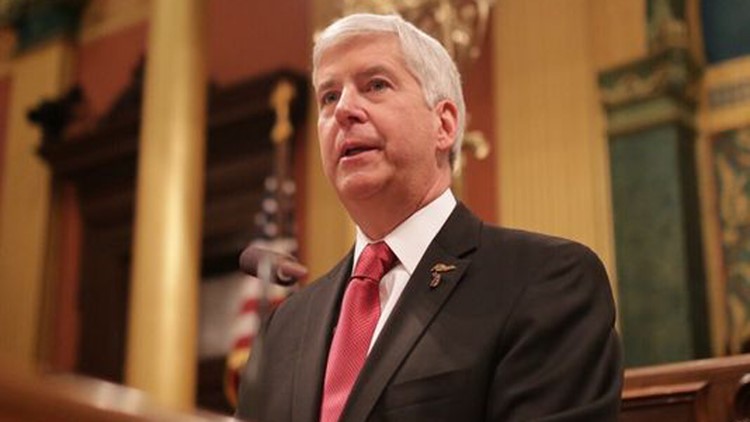A spokesman for Gov. Rick Snyder says his administration will appeal the ordered return of more than $550 million to Michigan school employees, despite Attorney General Bill Schuette's refusal to provide state attorneys to fight the case.
“These payments are necessary for the long-term financial stability of the retirement system teachers rely on for health care benefits after their years of hard work come to a close," Snyder spokeswoman Anna Heaton said Tuesday. "Keeping the money in the system will help their investments continue to grow and benefit Michigan educators for decades to come.”
Heaton's statement on behalf of the governor same shortly after Schuette issued a statement Tuesday saying his lawyers won't be involved if Snyder appeals a ruling from the Michigan Court of Appeals that says the money was unlawfully taken through required 3% deductions from the pay checks of Michigan teachers and other school employees.
"The Attorney General is declining to provide counsel if the Governor wishes to appeal the 3% MPSERS (Michigan Public School Employees' Retirement System) ruling," Schuette spokeswoman Andrea Bitely said.
Instead, "the Department of Attorney General will provide an appointment for a Special Assistant Attorney General," hired from outside Schuette's office, she said.
The pre-emptive announcement from Schuette appears to be a further sign of frosty relations between Snyder and Schuette, both Republicans. The two have sparred over several issues, most recently over whether Snyder's attorneys have been cooperative enough in providing records in connection with a Schuette-ordered investigation of the Flint drinking water crisis.
The state had been mulling whether to appeal a June 7 ruling from the Michigan Court of Appeals which, for the second time, found unconstitutional a 2010 state law under which the state took 3% of school employees' pay to help pay for retiree health care.
During the lengthy court battle, the money collected has been held in escrow and more than 200,000 current and former school employees are eligible to share in more than $550 million if the latest ruling stands.
School employees recently rallied in Lansing, urging Snyder and Schuette to return the money.
The American Federation of Teachers, joined by other school employee unions, argued the 2010 law was an overreach because it required payments from employees who were not guaranteed health care when they retired.
The Legislature passed the law in 2010, during the administration of former Gov. Jennifer Granholm, requiring all school employees to put 3% of their pay toward supporting the MPSERS.
The trial court ruled the law violated the state and federal constitutions. The Michigan Court of Appeals also ruled the law unconstitutional, and in 2012, the state appealed to the Michigan Supreme Court. The case sat on the Michigan Supreme Court docket for nearly two years, by which time a challenge to the replacement law to the 2010 law, passed by the Legislature under Snyder in 2012, also worked its way to the Supreme Court.
In 2015, the Michigan Supreme Court ruled the 2012 law constitutional, partly because it gave school employees an option as to whether money would be deducted from their paychecks or not. The high court then vacated the Michigan Court of Appeals' ruling on the 2010 law and sent that case back to the Court of Appeals to determine whether the 2012 law or the Supreme Court's ruling on it rendered moot any part of the Court of Appeals ruling on the 2010 law.
In the latest opinion, a three-judge panel of the Michigan Court of Appeals said neither the passage of the 2012 law, nor the Michigan Supreme Court's finding that the 2012 law is constitutional, changed its ruling on the 2010 law.
For the period of time from late 2010 until 2013, when the 2010 law was in effect but the 2012 law was not, "the compulsory collection of 3% of employee wages ... was unconstitutional," wrote Appeals Court Judge Douglas Shapiro, joined by Judge Jane Beckering. Judge Henry Saad agreed with the outcome, though he dissented over part of the ruling.
"Accordingly, we remand this case to the trial court with direction to return the subject funds, with interest, to the relevant employees."



